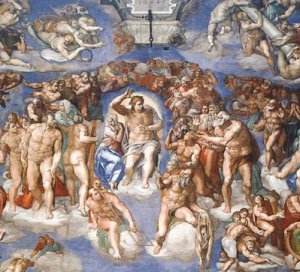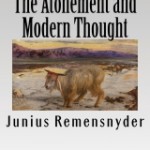
Intro: The Fear-Invoking Athanasian Creed?
The Christian – who is justified by God’s grace in Jesus Christ though faith – should be at peace with God and not live in fear of him, correct?
This would seem to be logical consequence of a message like that of Romans 5:1: “Therefore, since we have been justified by faith, we have peace with God through our Lord Jesus Christ.” And yet, for confessional Christians who recite the Athanasian Creed once a year (as we did a few weeks ago), the end of this creed might, on occasion, cause one to doubt and wonder:
“…At whose coming all men will rise again with their bodies; And shall give account for their own works. And they that have done good shall go into life everlasting; and they that have done evil, into everlasting fire.”

And here, as when reading passages like John 5:28 and 29 and Revelation 20:12, the doubts might encroach at a fast and furious pace! How can we not be terrified? We might wonder: “Do words like these work against salvation by faith by declaring a salvation by works?” And even if they don’t cause us to wonder about this, still, what does this mean for me? Me, whose love for God and neighbor often seems so poor? Can I be sure I am even a Christian?
A few responses here, to counter this doubt and, possibly – terror!*
I. Fear God? In the first place “no”.
We need to recognize that the Athanasian Creed is thoroughly biblical. In addition to the verses noted above, Romans 2:13, for example, says: “For it is not the hearers of the law who are righteous before God, but the doers of the law who will be justified.” There is a very real sense that these words mean exactly what they say. Simply put, at the last judgment, those who have shown fruits of repentance and good works according to the 10 commandments (even if it is just the first of the ten!) will be revealed by God to all persons to be His faithful, thankful, and loyal children. No one will doubt Him.

The fruits of repentance and faith are even seen imperfectly prior to the final judgment in persons like the sinful woman who bathed Jesus’ feet with her tears (see Luke 7). “I tell you, her many sins have been forgiven—as her great love has shown“, Jesus says to the Pharisees (before turning to the woman and assuring her that her sins are forgiven and her faith has saved her!).
When if comes to what these good works look like, they include both the fulfillment of the first and second table of God’s Ten Commandments. For the first table of the Law, this means fearing, loving, and trusting God alone, gathering for worship frequently with His people, and praying, praising, proclaiming and singing His Name and deeds. When it comes to the second table of the law, it means not only restraining from sins towards one’s neighbors, but works of love and mercy shown towards them, starting with the family of God. This also includes the kind of forbearance and mercy that God undoubtedly showed the sinful woman of Luke 7 and shows us in His Son (“Or do you presume on the riches of his kindness and forbearance and patience, not knowing that God’s kindness is meant to lead you to repentance?”).
These are those who reveal themselves to be the “true circumcision” (Rom. 2:29), those whom God knows according to faith. That said, this does not mean that the end of the Athanasian Creed is the kind of message that a doubting Christian and/or terrified sinner needs addressed to him! After all, the default orientation of our “Old Adam” – who remains even in regenerated believers! (see Gal. 5 and Rom. 7) – is not only to get away with whatever sin we can, but also to believe that we can be justified not only before men but before God by our good actions and words (and perhaps even thoughts and desires!). If you try to earn grace by your works, you make everything worse, because you are a bad tree, Luther said. This inevitably plays itself out in the dual extremes of either pride (I’m doing it ; I’m making it) or despair (there is no way I can do this, make it).
In short, words about the final judgement according to works – or even words explaining how this final judgement fits with our understanding of the judgement of each individual alone before God by faith alone! – can either stoke our pride, or leave us relentlessly accused – even unto despair.
![[I felt I] "was altogether born again and had entered paradise itself through open gates . . . that place in Paul was for me truly the gate to paradise." -- Martin Luther, on coming to understand Romans 1:17.](https://infanttheology.files.wordpress.com/2016/04/lutherstainedglasss.png)
II. Fear God? In the second place, “yes” – some fear, not terror.
…with all this said, ongoing accusation has its place in the Christian life as well – for damnable pride, sloth, and other sin always remain. Does this mean living in fear – or even terror, of God? The Eastern Orthodox Christian writer Elder Sophrony, for example, talks about how
“a person who ‘keeps his mind in hell’ is ever aware that only one fate is appropriate for his deeds, eternal damnation. This consideration sears humility into his soul, as he finds himself utterly unable to lift his eyes toward the face of God.”
“Keep your mind in hell and despair not,” he counseled.**
This is something I can identify with. On any given Sunday, for example, I will utter the words of our church’s liturgy:
Most merciful God, we confess that we are by nature sinful and unclean. We have sinned against you in thought, word, and deed, by what we have done, and by what we have left undone. We have not loved you with our whole heart; we have not loved our neighbors as ourselves. We justly deserve your present and eternal punishment. For the sake of Your Son, Jesus Christ, have mercy on us. Forgive us, renew us, and lead us, so that we may delight in Your will and walk in Your ways to the glory of Your holy name. Amen.
Is that right? Or is that a bit extreme?! In the rest of this short article, I want to try to address this question in some detail, talking in particular about how it relates to fearing God.
Regarding that topic, I have been asked some very good questions lately about what this means or should mean. And this, in turn, has helped me to better formulate my own thoughts to more effectively answer the students who have been asking me about it. Now, when I get comments like “I am not sure why we are to fear God”, I talk about things in the following way…
To begin, we were not created to fear God in terror, but rather in a childlike awe and reverence. Of course, then there is Adam and Eve’s fall into sin. Hence, the Bible notifies us that the fear of the Lord is the beginning of knowledge, and therefore, an even genuine terror of the Holy One is wholly appropriate for those opposed to God. But then there is the redemption through the blood of Christ, and here we recall the words of I John 5: perfect love drives out fear! This would mean that the love of Christ drives us not to fear in terror, but to go back to Eden: reverential awe and wonder.

So why then, those words from the liturgy? The fact of the matter is that we have only experienced the firstfruits of the new creation. We are new men in Christ, but again, Galatians 5 and Romans 7 indicates that there is also an “old man”, or “Old Adam”: something inside us that by nature desires and pursues things that are wrong. Here we see the ongoing infection of sin and its power in us. This has sometimes been expressed in this way: Christians are sinners and saints at the same time (simul), possessing both an old and new nature (perhaps analogous to the divine and human natures of Christ – see my old post “Not Radical Enough: the Problem with Radical Lutherans Like Gerhard Forde”).
Christians, insofar as they are new creations in Christ, need not live in fear, but our old man does (though often not directly through fear of God – Old Adam suppresses his knowledge of God!). And Christians, again insofar as they are new creations, are pleased when the old man they know is still within and can’t ever shake – their “imposter self” as one put it – is afraid of God. The Christian can know that God is not angry with them, even as they are often angry with themselves! And this is good, for the old man is to be driven out of us more and more with the Word of God*** – even as this will finally occur en toto only on the last day!
That said, perhaps we can say that while the Christian may fear God in two ways (reverential awe and wonder according to the new man/saint, genuine fear of the holy according to the old man/sinner), he, unlike the unbeliever, need not be terrified, because the fear of God is tempered by three facts:
- Sin is not imputed to the believer because of Christ’s fulfillment of the law and His sacrifice
- Accordingly, the Christian, insofar as he is a new man, does not have a desire to sin and in fact fights against it****
- God does not act to punish His children (act punitively towards us on the basis of strict, retributive, justice) but rather disciplines those He loves
This means He is always looking to not only forgive our sin, but lead us into a better and more appreciative understanding of who He is, who we are, and who He has called us to be.
These are the kinds of things I tell my students.
III. Fear God? In the third place, “no”.
All this said, it does a Christian well to ponder that our best actions – even though good works are most definitely not needed to earn God’s approval but rather to serve our neighbor in genuine love! – truly are worthy not just of cleansing fire but hell-fire. God created us as persons who would freely and joyfully represent Him – who is Love and Life – to our neighbor. But again, then came the fall into sin and things have gotten very nasty (and are always getting more so, it seems). Now it is as C.S. Lewis and T.S. Elliot, respectively, have said:
“For the first time I examined myself with a seriously practical purpose. And there I found what appalled me: a zoo of lusts, a bedlam of ambitions, a nursery of fears, a harem of fondled hatreds. My name was legion.”
and
“our offenses, infidelities, greed, lust, and violence ripple through families and communities, affecting people unto the third and fourth generation. We spend much of our time, both individually and corporately, protecting ourselves against this knowledge.”

And these quotations can be viewed as understatements! In the third chapter of the book of Romans, the Apostle Paul quotes the Psalmist who accuses humanity of making itself “worthless”. Jesus Christ also reminds us that “whoever hates his life in this world will keep it for eternal life.” Socrates could not have been more wrong when he claimed that those who know the good will do it – even those who do do it know their best deeds need to be washed.
For me, also speaking personally as a Christian, there is a sense in which I, like Satan, am a masterful destroyer of relationships due to the infection that continues to rage within me. When I stand naked in the midst of a holy God I know that I am undone, for the meaning of God’s eternal law – His 10 commandments – goes deep. I have denied him before men, in the name of “justice” refused to turn my cheek, refused to forgive from the heart 70 x 7, constantly mixed dung with precious perfume, ignored the unfortunate and outcasts who sense their need for Him more than most, lived as if this world is all there is, failed to heartily do my duties for His glory, failed to see all disasters (man-made or not) as calling all to repentance, put up fronts of righteousness, and hated my enemies for whom Christ bled. I have refused to recognize marriage – my own marriage and resultant family – as a crucial sacramental sign of God’s presence in the world. My actions – or inactions – have served as an acid that dissolve the Gospel proclamation that brings forgiveness, life, and salvation. How little I must know my God! In short, how can I be certain that my lack of trust, confidence, and reliance on God – and hence, love – has not caused my neighbor to perish? *****
All of this said, God has chosen to love me – all of us! – in spite of our sin, taking these sins upon Himself and bearing their cost that we might have life eternal in, with, and through Him. Through God’s love alone, ultimately revealed to the nth degree in the work of Jesus Christ, we are, indeed, restored to peace with Him! It is because of the fact of this relationship that when He calls us “sinners” and calls our desires and actions “sins”, we are able to not only bear with this, but actually able to exult and glory in His companionship! Even when we realize, and are saddened by, the fact that our actions do not deserve such kindness on His part… Nevertheless, He goes on to look us in the eye with love and tender mercies, and causes us to rise again in joy, and to go forth in His pardon and power! (being able to talk like this, by the way, is why the 16th century Reformation of the church was necessary).
For this our earthly journey we live – always – by His tender mercies and grace!
FIN
Images: Sir Joseph Noel Paton, “Dawn: Luther at Erfurt” which depicts Martin Luther discovering the doctrine of Justification by Faith ; http://www.topofart.com/artists/Sir_Joseph_Noel_Paton/art_reproduction/5836/Dawn:_Luther_at_Erfurt.php Original hangs in the National Galleries of Scotland, Edinburgh, United Kingdom ; bad fruit image from https://jennygeddes.files.wordpress.com/2016/05/badfruit.jpg?w=340&h=289 ; The Martin Luther window at St. Matthew’s Lutheran Church in Charleston, SC by Cadetgray ; 19th-century photograph of a young CFW Walther; originally from http://www.reclaimingwalther.org/ (public domain) ; Christ Embracing St Bernard by Francisco Ribalta
*An additional post I’ve done on this topic, “Unchildlike Reformation Eve” is here.
**C.F.W. Walther, pictured above, wrote something similar as he reflected on Luther’s experience: “Luther contends that the testimony of the Holy Spirit in the hearts of God’s children is accompanied with strife. There must be confidence in the Christians and at the same time fear and trembling. This is possible. I can cross an awful abyss, trembling at the thought that I may be hurled into it; but seeing a barrier erected on both sides of my path I gather confidence and cross over, confident of safety. That is the strange paradox of the heart of a Christian: he fears and trembles and still is assured.” (200, The Proper Distinction Between Law and Gospel, 1897).
***Regarding the Christian’s “Old Adam”, an LC-MS pastor colorfully put it this way: “[After believing the Gospel that saves me], I look back at the law that corals me, that pulls me in and says “you will not go past this line, this boundary” and the old Adam starts digging, and starts trying to figure out an escape plan. And the new man in Christ is like “Come here. We gotta kill you. We gotta kill you more because you are getting in the way of me being with Christ.”
****Luther writes that to the extent that a believer is “actively” righteous, the law’s accusatory office has ceased. Under the accusatory law insofar as they are sinners, Christians are also “without the law” because Christ’s fulfillment of the law is imputed to them and also insofar as they battle sin in their lives in the power of the Holy Spirit (see p. 16-17 here)
****We are reminded that “God’s Kingdom comes without us”, as Luther said. That said, God chooses us to be the vessels who communicate His message to others, and so I would only assert: “You should not think you are indispensable. The Kingdom of God comes without any person in particular.”
Also, most of this paragraph was taken from an old, heartfelt post I did here – which I think this most recent post tempers a bit, and puts in a more helpful context.












